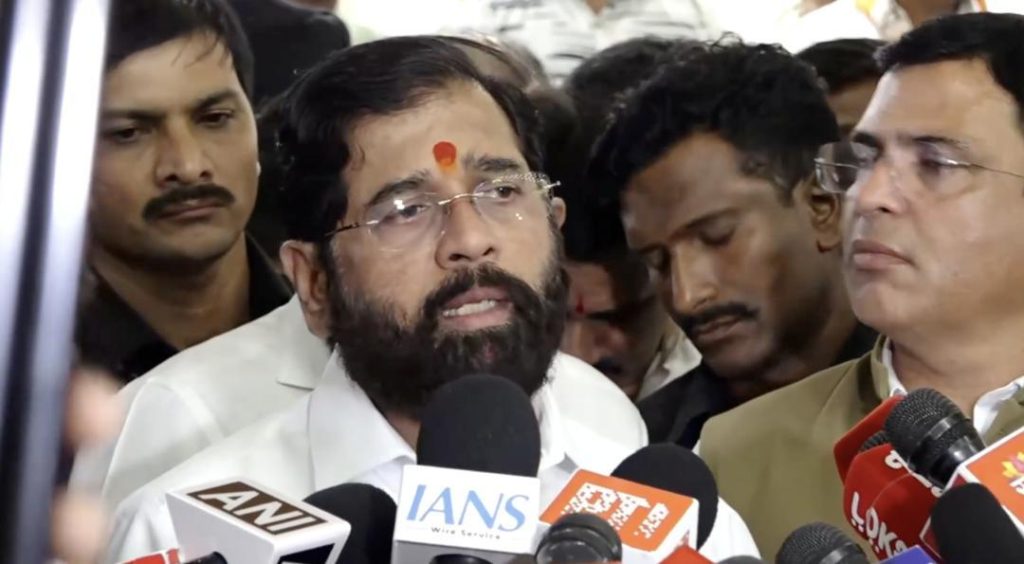
Uddhav Thackeray indulges in double-faced politics: Eknath Shinde
The politics of double-facedness has been a recurring theme in Indian politics, and the latest instance of this phenomenon has emerged in the state of Maharashtra. Maharashtra Deputy Chief Minister Eknath Shinde has taken a jibe at Shiv Sena (UBT) chief Uddhav Thackeray and his son Aaditya Thackeray, accusing them of indulging in double-faced politics.
The controversy began when Shinde hinted at the Thackeray duo’s hypocrisy on the issue of making Hindi compulsory in the state. He pointed out that while Shiv Sena (UBT) was in power, they accepted the Dr Raghunath Mashelkar Committee’s recommendation to make Hindi compulsory, but now, they are opposing it.
Shinde’s remarks came in response to the recent stance taken by the Thackeray duo on the issue. Shiv Sena (UBT) has been criticizing the Mahayuti government, led by the Bharatiya Janata Party (BJP), for not making Hindi compulsory in the state. However, Shinde has now revealed that the Thackerays were not opposed to the idea of making Hindi compulsory when they were in power.
The Deputy Chief Minister’s statement has sparked a political controversy, with many questioning the Thackerays’ stance on the issue. Shinde’s remarks have also led to a war of words between the Shiv Sena (UBT) and the Mahayuti government.
Double-faced politics
Shinde’s accusations against the Thackerays are not new. The Shiv Sena (UBT) has a history of practicing double-faced politics, where they take a different stance depending on their political expediency. This has been a major criticism of the party, with many accusing them of being opportunistic and lacking in ideological conviction.
The Thackerays’ stance on the issue of making Hindi compulsory is a classic example of this double-faced politics. When they were in power, they accepted the recommendation of the Dr Raghunath Mashelkar Committee, which suggested making Hindi compulsory in the state. However, now that they are in opposition, they are opposing the idea.
This kind of politics is not only damaging to the party’s reputation but also to the state’s interests. It creates confusion and uncertainty among the people, and makes it difficult for them to take the party seriously.
Aaditya Thackeray’s silence
Aaditya Thackeray, the son of Uddhav Thackeray and a key leader of the Shiv Sena (UBT), has remained silent on the issue. This has led to speculation that he may be trying to distance himself from his father’s controversial statement.
However, Shinde has hinted that Aaditya Thackeray’s silence is a tacit approval of his father’s statement. “Aaditya Thackeray is also responsible for the double-faced politics of the Shiv Sena (UBT),” Shinde said in a statement.
The Deputy Chief Minister’s statement has put the Thackerays on the defensive, and they are now trying to spin the controversy in their favor. However, the damage has already been done, and the Thackerays’ reputation has taken a hit.
Conclusion
The controversy surrounding the Thackerays’ stance on making Hindi compulsory in the state is a classic example of double-faced politics. The Shiv Sena (UBT) has a history of practicing this kind of politics, and the latest instance is no exception.
The Thackerays’ hypocrisy on the issue has been exposed, and the people of Maharashtra are now questioning their commitment to the cause of making Hindi compulsory. The Mahayuti government has not made Hindi compulsory, but the Thackerays’ u-turn on the issue has raised questions about their intentions.
As the controversy continues to unfold, one thing is clear – the Thackerays’ double-faced politics has damaged their reputation and created confusion among the people. It remains to be seen how the Thackerays will recover from this controversy and regain the trust of the people.
Source: https://x.com/mieknathshinde/status/1938978993417666875






